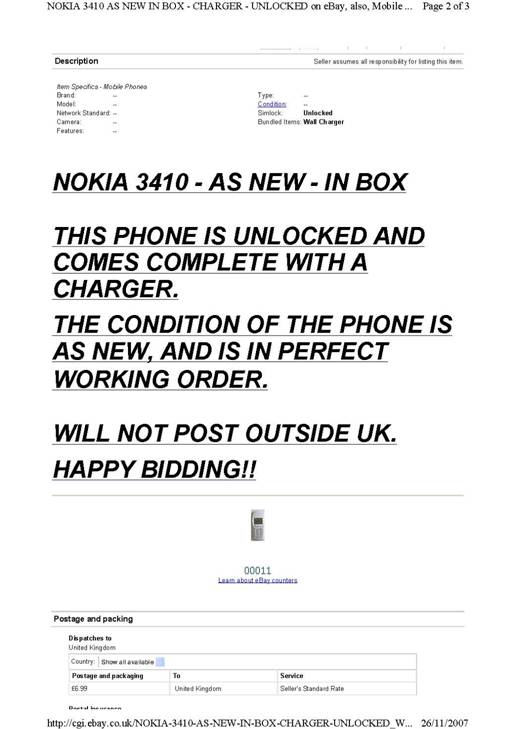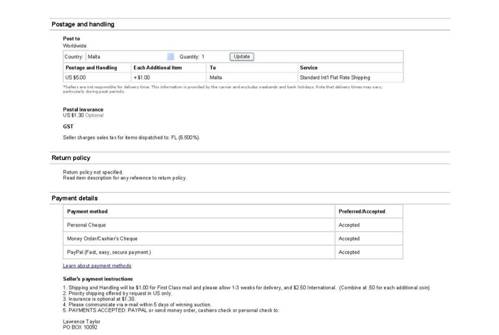Read carefully the description accompanying the item. Is its condition new or used? Does it work, or is it being sold for parts? Where is the minor scratch or slight dent situated? Is this an auction or is it a normal sale? If the web site allows purchasers to rate the seller and pass comments about their own shopping experience read these reviews. Some sites also keep track of the number of transactions the seller has made. This helps you get an idea of who is on the other side of the transaction.

Do not hesitate to ask questions after having read the information accompanying the item. Many sellers tend to be irritated at people who ask questions clearly noted with the item. Ask the seller to email you a photo of the object if you are not clear about certain statements such as inconspicuous this or soiled that.

Sometimes the cost of shipping exceeds that cost of the item itself – factor this into the final cost of the item. Is the item being sent by normal or registered mail or is it being sent by courier? What happens if the item does not arrive – are you entitled for a replacement at no cost? How long does it take for the parcel to get to Malta (double that time for busy periods)? When will the seller ship the item – for example two business days after the payment is received?

Answers to these questions will give you a good idea of what to expect and when to expect it as well as any risks. Certain merchants charge considerably more to send an item to Malta than to other European counties. Some do this out of ignorance because they don’t know where Malta is and therefore opt to charge the highest postage possible. I have had occasion where the merchant revised the postage downwards after I submitted the postage costs to other European destinations and he checked with his post office. Sadly certain sellers limit the shipping options they provide; for example you cannot ask for an item to be sent by recorded mail.

Buying more of the item or combining goods from the same seller as a single package brings down the gross cost of the items. Can you get family or friends interested in purchasing something from the same merchant? Can you combine all your gifts from one source?
Purchasing from an EU country means that you do not pay VAT when you collect the item locally. But this does not apply to non-EU purchases. Inform yourself about additional costs and with certain goods make sure you can legally import them into Malta. Be cautious about European web sites that allow non-Europeans to sell from them. Always look for the Item location information as this states from there the item originates. Don’t forget to ask whether the seller will issue an official Tax receipt if you need one. Some don’t unless specifically asked.
After having fully understood what you are buying and the final cost, you have to decide with the seller how to pay for them. There are three methods one can pay: Banker’s draft, Internet Payment Processing Services or Credit Card.
The Banker’s draft is the least common method because it is slow and gives least protection to the buyer. The chain of events is as follows: after agreeing on the price, you go to the bank and get a cheque; you mail the same to the supplier who must then cash it. Once the funds have cleared, the seller ships the goods. This method of payment takes at least one week longer than other methods. A Banker’s draft also carries additional charges: Maltese bank charges, charges to mail the cheque (via recorded delivery), as well as bank changes the seller might incur (and pass on to you). Getting a refund if the transaction goes wrong depends entirely upon the seller; you have very little control.
Reputable Internet Payment Processing Services such as PayPal, WorldPay and NoChex are the most popular method to payment. PayPal, which is owned by eBay (the world’s largest online auction site), is the market leader. PayPal acts as a go between you and the seller. You give your credit card details to PayPal when you register an account with them. Every time you purchase something from a vendor who accepts PayPal (and many do) PayPal credit the vendor’s account while debiting your credit card. The vendor never gets to know your credit card or bank details. Your transaction may also be protected under the Buyer Protection Program in the event of a dispute between you and the seller (see point 9). You do not have to pay any charges to PayPal since the vendor picks up the tab.
Credit cards are also a very common method to pay for online purchases. Those who are not aware of Internet Payment Processing Services or who do not frequently affect online purchases tend to use credit cards. With credit you are normally afforded a certain amount of protection if a vendor is a fraudulent one. Unlike the payment processing service, paying for goods and services will mean that that the vendor will end up with your credit card details. You should always be cautious when supplying your credit card details since not all merchants have the same level of controls and security and even the most reputable get hacked. For example, in 2007 TJX group, operators of nearly 2,100 retail stores under the names Marshall's, TJ Maxx, HomeGoods and A.J. Wright throughout the U.S., Canada, and the United Kingdom admitted that 45.7 million customer accounts had been compromised. If your credit card details are stolen a hacker can make purchases on using your card. It is therefore in your interest to meticulously check your statement every month. If you think your account has been compromised contact your bank immediately.
Ideally you should have a card with a capped credit for internet purchases. Local banks offer a debit card that is linked to a special account. Unless funds are present in this account, transactions will fail. Thus if the card details are stolen transactions will not be honoured. You then use internet banking to transfer funds into this special account whenever you want to make a purchase.
Paying for goods with cash is not an option. Sending cash in the mail is insane since it cannot be traced, cannot be accounted for and cannot be linked to you (paper clips and staples do fall off)
Whenever you are entering your credit card or Internet Payment Processing Service details in a web site make sure that the page is secure. Never send credit card details via email since email can be read in transit and never act on emails from institutions that tell you that your account has been compromised or needs to be updated. If in doubt call the bank or forward them the email. Write down the web site address of the financial institutions you deal with and if you need to go to their site type in their address rather then open it from a link within an email.
